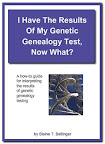 In my quest to learn more about my deep ancestry I've discovered that anthropology blogs provide a nice resource for information on the life and times of those who lived in Europe a very long time ago.
In my quest to learn more about my deep ancestry I've discovered that anthropology blogs provide a nice resource for information on the life and times of those who lived in Europe a very long time ago.Lately I've been reading Mathilda's Anthropology Blog with great interest. Mathilda had a fascinating article (reprinted) last month titled, "How To Lose a Mitochondrial DNA Lineage". "The study sought to answer the crucial question of whether Europeans descended from the first European farmers of the Neolithic period 7500 years ago, or from Paleolithic hunter-gatherers who were present in Europe since 40,000 years ago." Here's one place where hg H comes into the discussion:
Haplogroup H, hypothesized to have been present in Europe since at least the late Paleolithic and the most common haplogroup among present-day Europeans (approximately 50%) and Basque (62%), was also found at a high frequency of 48% among the historical remains at Aldaieta, but at lower frequencies at the prehistoric sites (37% at SJAPL and Rico Ramos, 44% at Longar). This variation suggests that there was heterogeneity between the various prehistoric communities themselves, with some communities having a higher frequency of certain haplogroups than others. (Alzualde 2005)
Other haplogroups are discussed here as well, some in more detail than others. While this particular article doesn't disclose any great revelations about hg H it does provide an interesting look at what can be deduced about various groups from studying the DNA of ancient skeletal remains.
Mathilda has some wonderful photos to go along with many of her articles to show the types of artifacts my ancestors may have used. One article in particular that I found really interesting was, Cro-Magnon Clothing. The findings discussed here come from sites in the Czech Republic, a next door neighbor to Poland. And while there is no specific mention of hg H the time and place make it possible that these artifacts could have been created by members of hg H.
Anthropology may just be the link I was looking for... connecting genetics to ancient history to give me a picture of the life my ancestors led thousands of years ago. Mathilda's site makes for interesting reading. I recommend you check it out :-)



